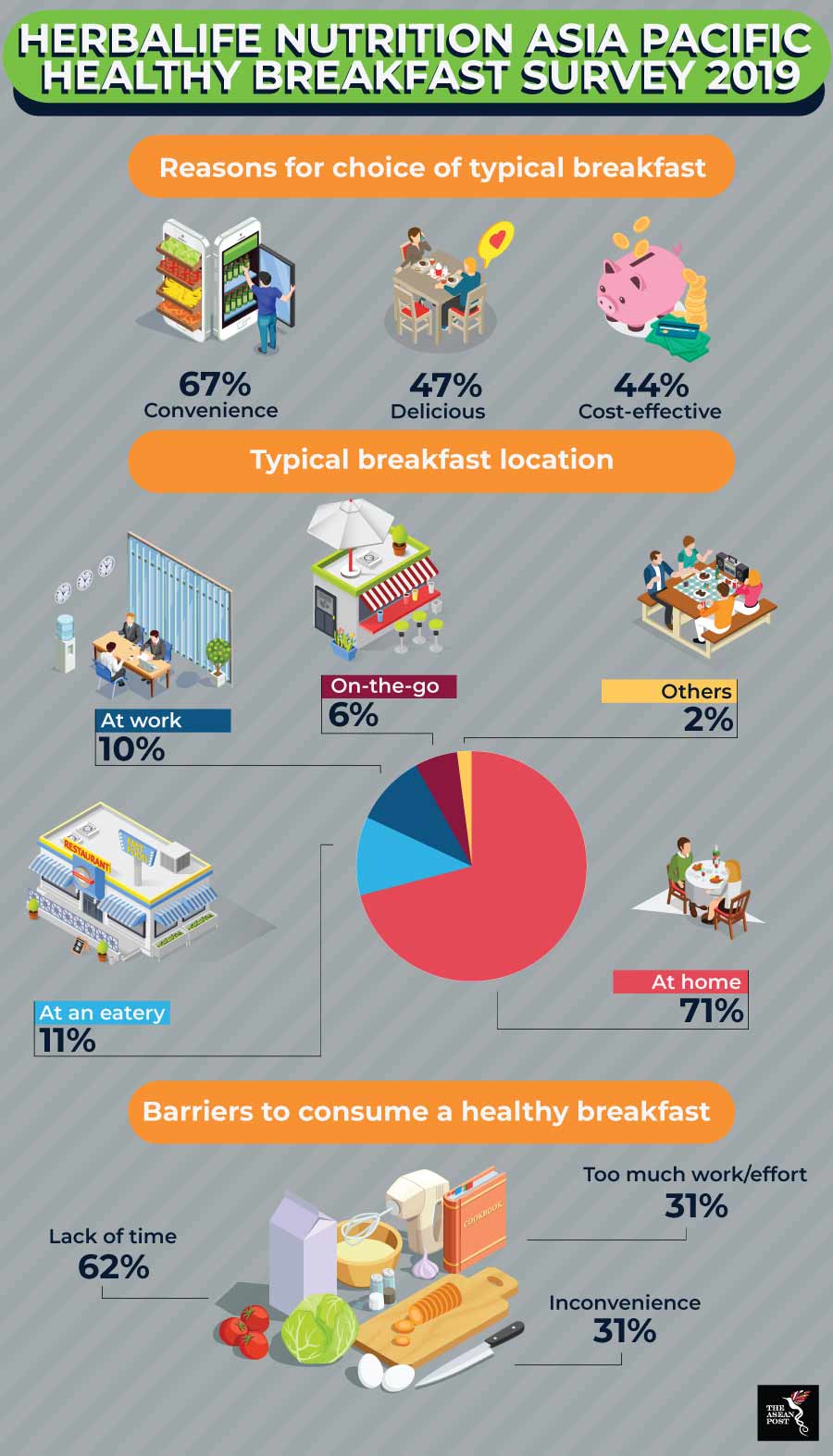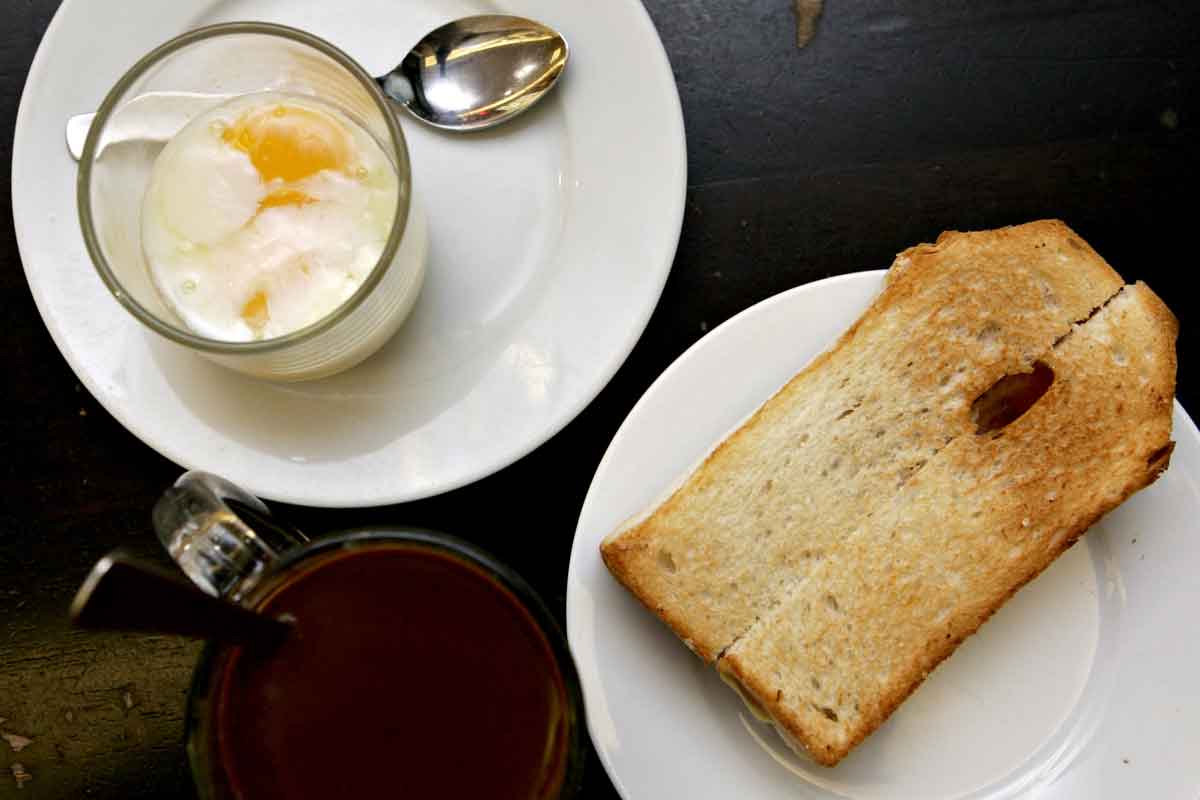Skip health reasons or nutrition – convenience is far more important for Southeast Asians when choosing what to eat for breakfast.
A recent survey by nutrition company Herbalife Nutrition found that while the majority of Asia Pacific consumers are aware of the benefits of a healthy breakfast, 67 percent of them still make breakfast decisions based on convenience,ahead of health benefits (43 percent) and nutritional value (33 percent).
Conducted in March with 5,500 respondents from 11 markets, the ASEAN respondents in the Herbalife Nutrition Asia Pacific Healthy Breakfast Survey 2019 were from Indonesia, Malaysia, the Philippines, Singapore, Thailand and Vietnam.
When asked what influenced their typical breakfast choices, the survey found that health benefits and nutritional value were secondary to convenience (67 percent), tastiness (47 percent) and cost effectiveness (44 percent).
Despite increasingly busy schedules and the rise of drive-throughs offering quick breakfasts on the go, when it comes to their preferred location to consume their first meal of the day, 70 percent of respondents replied they would rather eat at home. 11 percent preferred to eat at a nearby eatery, 10 percent would consume it at work while only six percent chose to have it on-the-go.
While the understanding of the ideal nutritional composition for a healthy breakfast differs widely across each country, over nine in 10 consumers in Indonesia, Malaysia, Philippines, Thailand and Vietnam said they would like to make their breakfasts healthier. key obstacles that prevented them from doing so.
However, the lack of time (62 percent), amount of effort required (31 percent) and inconvenience (31 percent) were key obstacles that prevented them from doing so.
 Source: Herbalife
Source: Herbalife“It is widely understood that breakfast is the most important meal of the day,” said Stephen Conchie, Senior Vice President and Managing Director, Asia Pacific, Herbalife Nutrition.
“Starting each day with a healthy breakfast supports metabolism, muscle health and long-term weight management. With this in mind, it is essential that consumers make informed decisions to kickstart their day with the right nutrients,” he added.
The most important meal of the day?
Helping to jumpstart our metabolism, breakfasts are associated with better cognitive performance and academic achievement. Breakfast’s health benefits are also notable, and apart from promoting better weight management, studies have found that those who skip breakfast are at higher risk of heart disease and type 2 diabetes.
However, there is conflicting information about whether breakfast is really the “most important meal of the day”.
A 2013 review of 54 studies noted that while the frequency of breakfast consumption has declined in recent decades, the type of breakfast consumed doesn’t matter as much as simply eating something.
Research into the topic has been ongoing for years, and a report titled ‘Breakfast in Human Nutrition: The International Breakfast Research Initiative’ which was published last May in the journal Nutrients noted that while breakfast has in recent years been implicated in weight control, cardio-metabolic risk factors and cognitive performance, at present, the literature remains inconclusive as to the precise health benefits of breakfast.
“There are extensive reports of breakfast’s contributions to daily food and nutrient intakes, as well as many studies that have compared daily food and nutrient intakes by breakfast consumers and skippers. However, significant variation exists in the definitions of breakfast and breakfast skippers, and in methods used to relate breakfast nutrient intakes to overall diet quality,” stated the report.
And maybe ASEAN’s focus on convenience when choosing what to eat for breakfast isn’t such a bad thing after all.
In her book ‘Breakfast – A history,” American food writer and culinary historian Heather Arndt Anderson wrote that breakfast was traditionally – dating back to Greek and Roman times – the least demanding of meals in culinary terms in that it consisted for centuries as a simple meal of bread, cheese, honey, oil and maybe wine.
Anderson noted that since ancient times, breakfast has been a meal characterised by convenience and required minimal preparation or further cooking. Convenience was important for early risers who had to tend to their crops or livestock or travel large distances after rising – and although today’s early risers might be more concerned about jumping out of bed and sending their children to school or beating rush-hour traffic on the way to work, it seems that a convenient breakfast is still as important as ever.
Related articles:
Stunted, wasting and overweight in ASEAN
Can a sugar tax dent Malaysia’s sweet tooth?
Southeast Asia is not sleeping enough
